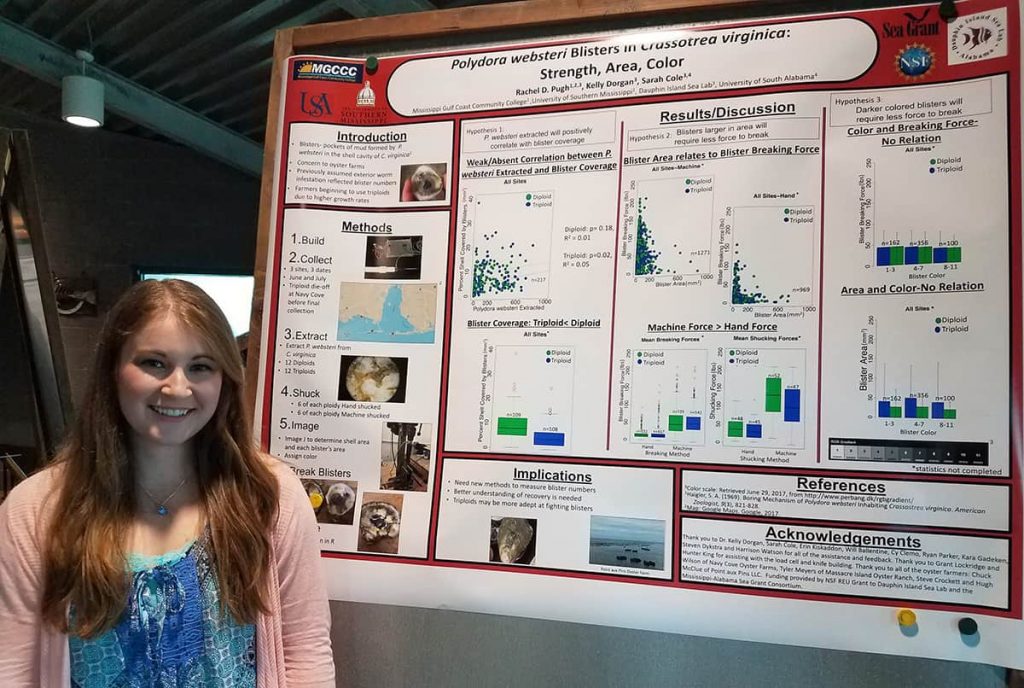
Mississippi Gulf Coast Community College graduate Rachel Pugh was one of five undergraduates to participate in the ten-week Research Experience for Undergraduates (REU) this summer at the Dauphin Island Sea Lab. The program sponsored by the National Science Foundation is an opportunity for students to take classroom knowledge of their research process and apply it to their scientific interests. For many of these students, it’s the first chance they have to experience the research process from beginning to end.
Pugh, from Hurley, graduated from MGCCC in May. One of her MGCCC instructors, Dr. Christy Philipoff, connected her to scientists across the Coast, including those at the Gulf Coast Research Lab, where she completed another internship.
“MGCCC prepared me well for my experience,” Pugh said. “I would like to thank my professors there for going above and beyond to help me in my academics and helping me connect with area scientists.”
During the REU, Pugh was paired with faculty members who mentored her during the program, which lasted from May 2 – August 4. Students engaged in the program have an opportunity to customize their experience based on their unique research interests. A marine biology major, Pugh said her summer was spent doing the kind of research she hopes to do as a scientist.
“I was working in the Sediment Ecology Lab of Dr. Kelly Dorgan, but I also worked closely with Dr. Bill Walton at the Auburn Shellfish Lab,” she said. “My research project focused on Polydora websteri in Crassotrea virginica, or mud blister worms in oysters. Mud blister worms are small, polychaete worms that create burrows in the shells of oysters. Some of these worms make their way into the shell cavity and create unsightly blisters filled with mud. These blisters were the focus of my study. They decrease the value of the oyster on the half-shell market, so they are a major concern for oyster farmers.”
She said she visited three local Alabama oyster farms to collect samples. “I then brought them back to the lab and assessed the blisters in different ways, including testing their strength with a force-sensing shucking knife I programmed,” she said. “My project is still ongoing as I am continuing to further analyze the data and working with another REU participant and our mentors to write a paper on our findings.”
Pugh also had the chance to begin her summer with a Coastal Louisiana Silica Cycling (CLASiC) research cruise in early May.
Pugh said the REU program at Dauphin Island Sea Lab was an amazing learning experience for her. She developed her own research methods and carried out her own field work. “I developed new skills such as electric wiring, programming and knowledge of several different coding languages,” she said. “The skills I gained will benefit me for the rest of my college experience and my career. I also made great connections with scientists and graduate students at the Sea Lab. The program was challenging, but it was an incredible experience. I would recommend it to any marine science major.”
Dr. Bill Walton, who serves as a DISL faculty mentor, said the experience accomplishes what the Sea Lab intended. “For me, it’s great to see undergraduates come in and get into the mix of research and all the demands of a field season. I also love seeing the point where a student starts to make the project his or her own.”
To learn more about the Research Experience for Undergraduates program at the Dauphin Island Sea Lab, visit disl.org/univ-prog/nsf-reu.





